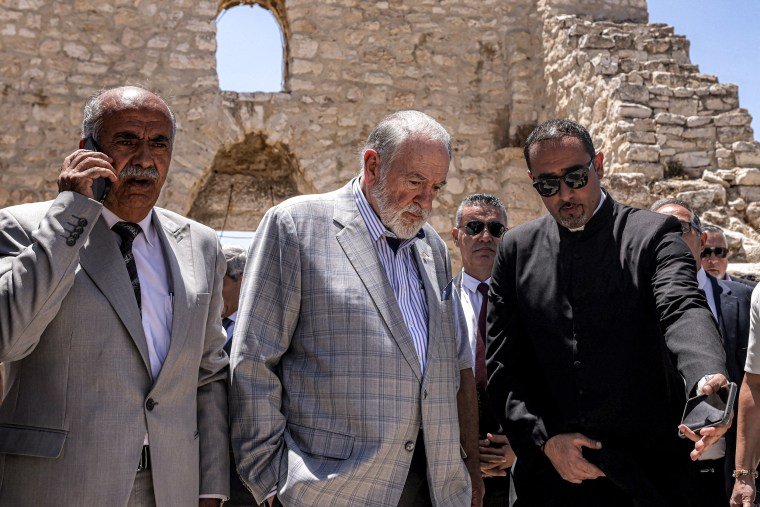WASHINGTON — Special envoy Steve Witkoff and U.S. Ambassador to Israel Mike Huckabee will travel to the Gaza Strip on Friday, the White House announced, a significant move as Israel continues facing mounting international pressure to allow increased aid into the enclave.
“Tomorrow, special envoy Witkoff and Ambassador Huckabee will be traveling into Gaza to inspect the current distribution sites and secure a plan to deliver more food and meet with local Gazans to hear firsthand about this dire situation on the ground,” White House press secretary Karoline Leavitt said during Thursday’s press briefing.
The trip comes as an increased number of people in Gaza are dying from malnutrition, prompting more nations to call for Israel to address the humanitarian situation. Leavitt said that the U.S. officials would work toward a plan for additional food and aid distribution.

“The special envoy and the ambassador will brief the president immediately after their visit to approve a final plan for food and aid distribution into the region, and we will provide more details for all of you once that plan is approved and agreed on by the president of the United States,” she said during the briefing.
Witkoff traveled to Israel overnight and met with Israeli Prime Minister Benjamin Netanyahu in Jerusalem on Thursday to address the humanitarian situation. President Donald Trump said earlier this week that Israel “has a lot of responsibility for flow of aid,” emphasizing that its government could greatly expand access to food.
Israel announced a “tactical pause” in military operations in Gaza on Sunday, stepping up efforts to provide humanitarian aid to civilians. Netanyahu said Monday that his government would work with international agencies, as well as with the U.S. and European nations, to ensure large amounts of aid enter the Gaza Strip.
In recent days, Trump has weighed in on the hunger crisis, saying, “We have to get the kids fed.” He said there was “real starvation” in Gaza, comments that were echoed by Vice President JD Vance, who said the administration was “very worried about the humanitarian problem in Gaza.”
The president also said this week that the U.S., alongside international partners, would help fund and set up food centers in Gaza.
Many Democratic lawmakers and some Republicans have also voiced concern about the situation and are pushing the Trump administration to help broker a ceasefire agreement. Witkoff pulled the U.S. negotiating team out of Doha, Qatar, last week after he said Hamas showed “a lack of desire” to reach a deal.
More than 120 people in Gaza have died from malnutrition since the start of the war, according to the Palestinian Health Ministry in Hamas-run Gaza. The Integrated Food Security Phase Classification said in recent days that “the worst-case scenario of famine is currently playing out in the Gaza Strip.”
A growing number of countries are increasingly condemning the humanitarian situation in Gaza, and the United Kingdom, France and Canada said they plan to recognize a Palestinian state this fall. British Prime Minister Keir Starmer’s office said it would recognize a Palestinian state unless Israel “takes substantive steps to end the appalling situation in Gaza.”
“The president expressed his displeasure and his disagreement with the leaders of France, the United Kingdom and Canada,” Leavitt said during the briefing. “He feels as though that’s rewarding Hamas at a time where Hamas is the true impediment to a ceasefire and to the release of all of the hostages.”




